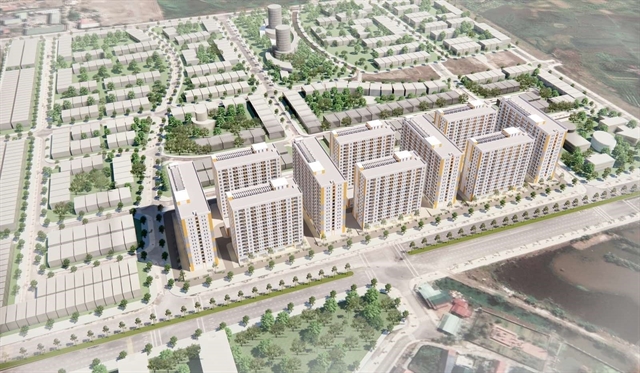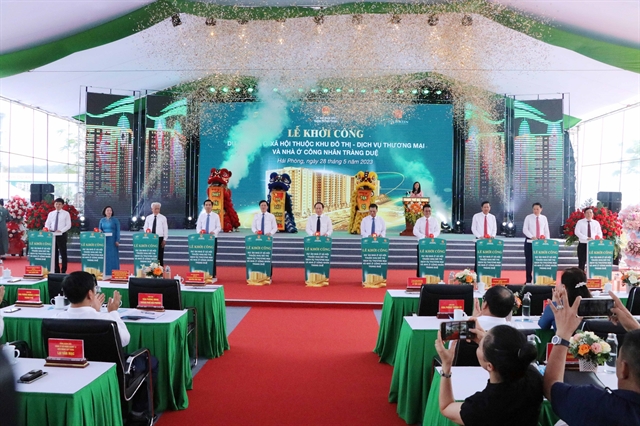 Society
Society

 |
| A perspective of the social housing project at Tràng Duệ Commercial Services and Workers' Housing Urban Area in An Dương District, Hải Phòng City. — VNA/VNS Photo |
HẢI PHÒNG — Hải Phòng City’s administration has made efforts to make the city one of the leading localities in the country in social housing development, improving people's lives as well as solving the housing problem for families living in dilapidated and old residential buildings in the city.
On April 12, 2022, the People's Council of the city issued Resolution 04 on implementing the "Project to build social housing combined with housing solution for families living in old apartment buildings in the city".
The move made the city a pioneering locality in the country in deploying social housing projects combined with removing dilapidated and old residential buildings, reported Hải Phòng online newspaper.
The move is completely suitable with the task of developing 33,500 social housing apartments assigned by the Prime Minister to the city under his Decision 338/QĐ-TTg.
Deputy chairman of the People's Committee of Hải Phòng Nguyễn Đức Thọ said building social housing would solve the current shortcomings in renovating dilapidated and old residential buildings in the city.
Therefore, the city had prioritised suitable land funds with convenient locations and infrastructure to attract local businesses to use non-state budget funds to invest in the social housing projects.
Now, the city's social housing projects have been quickly implemented.
Specifically, there are five social housing projects being deployed in four districts of Ngô Quyền, Lê Chân, Kiến An and Đồ Sơn.
After the projects are completed, the city will have a housing fund of about 8,000 apartments, including 5,700 apartments serving households evacuated from dilapidated old residential buildings.
Thọ also said that the city had focused on carrying out the social housing projects to meet the goal of providing 48,000 apartments for low-income people and workers by 2030, higher than the target assigned by the Government.
Two social housing projects have started construction in the city so far this year. Of which, the social housing project at Tràng Duệ Commercial Services and Workers' Housing Urban Area accomodates 10 buildings with a total of 2,538 apartments, worth more than VNĐ1.59 trillion (US$65.3 million).
The project was started in May. It is expected that by the end of next year, the project will provide 1,000 apartments to customers.
Also in May, another project to build social housing for employees of Pegatron Việt Nam Co., Ltd. on an area of 5.04 ha was started. The project has a scale of 10 high-rise buildings and total investment of $68.3 million, expected to provide accommodation for about 10,000 workers.
In addition, two other worker housing projects have finished selection of investors, two other projects are selecting investors; and five more projects are slated to be implemented after 2025.
Workers’ wishes
Trần Thị Duyên of Thanh Hóa Province who came to Hải Phòng City to work at Tràng Duệ Industrial Park since 2020, said she and her husband rented a room in Quốc Tuấn Commune in An Dương District at the price of VNĐ2.5 million ($102) per month.
The living conditions at the rented room were very inconvenient and cramped, she said.
They wished to have a social housing project apartment so that they could have a better living environment in the future.
"Having our own apartment, no matter how small, is a long-standing wish of my husband and I,” she said.
However, with their current salary, it would take them 15-20 years of saving to buy an apartment in the city.
“I really hope the city pays more attention to building housing for workers, and supporting us to buy low-price apartments,” she said.
Chairwoman of the Confederation of Labour of Ngô Quyền District Phạm Thị Hưng said workers in local industrial parks could only cover their daily living expenses with their current income.
It was difficult for them to have enough savings to buy commercial apartments. If social housing areas for workers were set up, it would be a motivation for them to feel secure in working and sticking with the business, she said.
For the city, this was an important condition to attract human resources to meet development requirements in the future, she said.
Statistics from Hải Phòng Economic Zone Management Board showed that there are 14 industrial parks operating in the city. The total number of workers working in the industrial parks is approximately 194,000 people, including about 67,000 immigrant workers needing housing.
Social housing worth living in
 |
| The groundbreaking ceremony of the social housing project at Tràng Duệ Commercial Services and Workers' Housing Urban Area in An Dương District, Hải Phòng City in May. — VNA/VNS Photo |
At inspections of the progress of implementing the social housing projects in the city and at the city’s meetings to consider and decide on related issues, the city’s Party Secretary Lê Tiến Châu said: “Social housing must be a place worth living, where people want to live.”
He said it was necessary to develop social housing with a typical model of Hải Phòng.
“The city’s social housing is not a housing area for disadvantaged people with adequate living conditions, but it must be new-style urban areas approaching the requirements of commercial housing areas with comfortable space, convenient location, good quality and price suitable for low-income people,” he said.
During an inspection of a number of social and worker housing projects in the city at the end of October, deputy chairman of the city People's Committee Nguyễn Đức Thọ ordered the investors of these projects to prioritise project quality.
The investors must not simply operate for profit to cut costs, ignore or minimise the quality of the social housing, he said.
He also said that social housing architecture must be modern, maximising natural energy to save operating costs for people.
The quality of fire prevention and fighting equipment systems should be given top priority. Electrical equipment, water supply and drainage and elevator systems must have clear origins, ensuring smooth operation, he stressed.
Deputy director of the city’s Construction Department Đỗ Hữu Hưng said social housing's price segments would be developed from levels suitable for the majority of workers and low-income people to levels with quality and amenities equivalent to commercial housing.
The selling price was approved by the city specifically for each location. Accordingly, from 2014 to 2021, the People's Committee of the city approved the selling price of social housing projects using off-state budget capital for low-income people, with selling prices ranging from VNĐ9.4 to 14 million ($386-574) per sq.m2.
The social housing’s selling price of a project at 384 Lê Thánh Tông Street in Ngô Quyền District was approved at VNĐ 18.8 million ($772) per sq.m2 in accordance with current regulations.
For social housing projects to renovate dilapidated and old residential buildings, it costs VNĐ600 million ($24,660) for an apartment of 40-50 sq.m2. — VNS




